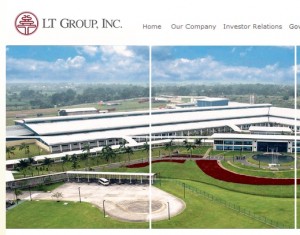LT Group’s earnings took a dive in H1
saw a 68.9-percent decline in first semester net profit of P2.16 billion in the first semester mostly due to the slowdown of its banking and tobacco businesses.
The hard liquor unit of tycoon Lucio Tan’s conglomerate incurred losses while the property unit contributed a modest income. The beer unit posted a double-digit growth in profits.
Banking unit Philippine National Bank’s attributable net income contribution to LTG amounted to P1.03 billion, or 48 percent of the total, while the tobacco business contributed P720 million or 33 percent of the total. Asia Brewery Inc. (ABI) accounted for 29 percent of total contributions with P628 million.
Eton Properties accounted for P38 million, or 2 percent of attributable income, while Tanduay Distillers Inc. posted P172 million in net loss.
PNB’s contribution declined in the absence of large trading gains that boosted comparative profits last year.
Also, income from the tobacco business fell by 72 percent to P720 million. LTG’s equity in net earnings from its 49.6-percent stake in Phillip Morris Fortune Tobacco Corp. amounted to P687 million.
“PMFTC continues to be adversely affected by the illicit trade in cigarettes,” the company said. “The Bureau of Customs has taken action by closing down the Customs bonded warehouse of a competitor and assessed it for Custom duties. PMFTC is awaiting the release of the implementing rules and regulations of the internal revenue stamps integrated system.”
On the other hand, Asia Brewery grew its six-month net profit by 30 percent year-on-year to P629 million. The group reported that its brands Cobra (carbonated energy drink), and Absolute and Summit (water) continued to be market leaders, while Tanduay Ice cornered over 90 percent of the alcopop market.
Eton’s net income of P38 million in the first semester were mostly attributed to higher leasing revenues.
In the case of Tanduay Distillers, the net loss was attributed to higher material costs, coupled with higher selling and marketing expenses.
Tanduay’s overall market share nevertheless slightly improved to 25.6 percent as of end-June from 23.3 percent at the end of 2013, based on data from Nielsen.
